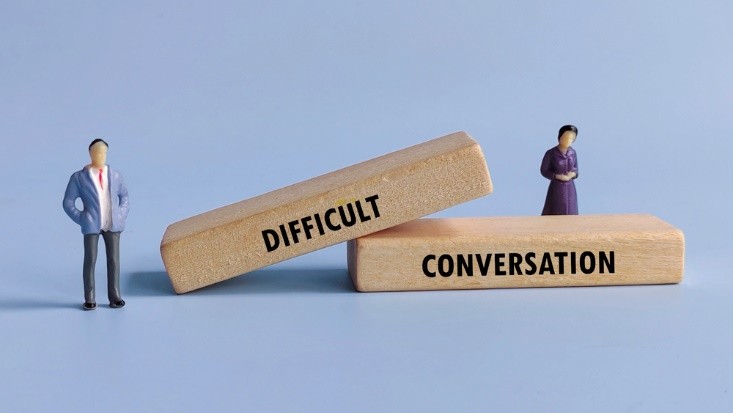
Why Difficult Conversations Matter
Let’s face it—difficult conversations are uncomfortable. Whether it’s delivering constructive feedback, addressing a breach of trust, or setting a boundary with a colleague or client, many people avoid these talks out of fear: fear of conflict, rejection, or damaging the relationship.
But avoidance comes at a steep cost.
When you don’t address issues directly, small problems compound into bigger ones, resentment builds, and performance suffers. Healthy communication is the foundation of trust and leadership. Learning how to navigate difficult conversations is a cornerstone of emotional intelligence and business success.
Here are 7 Strategies to Help You Have a Difficult Conversation with Confidence and Compassion:
- Know Your “Why”—And Your Desired Outcome
Before you initiate the conversation, pause and reflect: Why is this conversation important? What result do you want to achieve—not just for yourself, but for the relationship?
You need to be clear on three things before you say a word:
- Why this conversation matters
- What course of action or change you’d like to see from the other person
- How you want the person to feel when the conversation ends
Do you want them to take accountability? Change a behavior? Align on expectations? Equally important—do you want them to feel heard? Respected? Motivated to grow?
Too many difficult conversations fall flat—or worse, damage trust—because we haven’t thought through the emotional and behavioral outcomes we’re aiming for.
💡 Tip: Don’t go into the conversation to be right—go in to be effective. Clarity on purpose, action, and emotional tone will guide your words and energy.
- Regulate Your Emotions First
A difficult conversation begins before you open your mouth. It begins with you.
Take a moment to check in with your emotional state. If you’re frustrated, hurt, or feeling reactive, you’re more likely to escalate rather than resolve. Emotional regulation is the superpower of great communicators.
🧠 Neuroscience backs this up: When emotions spike, the rational brain (prefrontal cortex) goes offline. Calm your nervous system first—then proceed.
- Create a Safe Space for Dialogue
Safety isn’t just physical—it’s emotional. Set the stage for a respectful exchange by choosing the right time and environment. Avoid calling someone out in front of others or squeezing the conversation between back-to-back meetings.
Start with a neutral, non-threatening opener like:
“I’d like to talk about something that feels important for both of us. Is now a good time?”
This simple gesture shows respect and invites collaboration—not confrontation.
- Use “I” Statements, not “You” Accusations
The quickest way to make someone defensive is to start a sentence with “You always…” or “You never…”
Instead, use “I” statements that reflect your experience without assigning blame. Accountability and empathy are not mutually exclusive.
✅ Say: “I feel frustrated when deadlines aren’t met because it impacts the team.”
❌ Not: “You never turn things in on time.”
- Listen More Than You Talk
Difficult conversations aren’t monologues—they’re dialogues. If the other person feels unheard, nothing will change.
Practice active listening. That means listening without interrupting, summarizing what you hear, and asking clarifying questions.
👂 “Help me understand your perspective…”
The goal is to listen to connect—not to correct.
- Focus on the Future, Not Just the Past
It’s easy to fall into the trap of rehashing every past mistake. But that only fuels defensiveness. Instead, use the conversation as a springboard for what’s next.
Ask:
“How can we move forward together?”
“What would a better outcome look like next time?”
This keeps the tone solution-oriented and preserves the relationship—even if the feedback was hard to hear.
- End with Clear Agreements
Don’t leave the conversation vague or unresolved. Summarize what was discussed and clarify what happens next. This is where accountability is born.
✅ “So, we’ve agreed to check in weekly to avoid missed deadlines. I appreciate your openness.”
❌ “Let’s just hope it gets better.”
Clarity avoids confusion—and confusion kills trust.
Final Thoughts:
Difficult conversations don’t have to destroy relationships. In fact, when done right, they deepen trust. They show that you’re willing to show up honestly, even when it’s uncomfortable.
Emotional intelligence isn’t just about managing your own emotions—it’s about mastering communication that strengthens the human connection behind the business transaction.
So next time you’re tempted to avoid a tough talk, remember this: avoiding discomfort may feel easier in the moment, but courageous conversations create resilient relationships—and resilient relationships build thriving businesses.
Dr.Patty Ann
